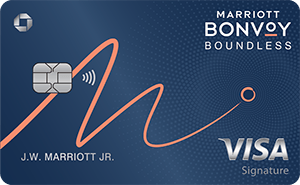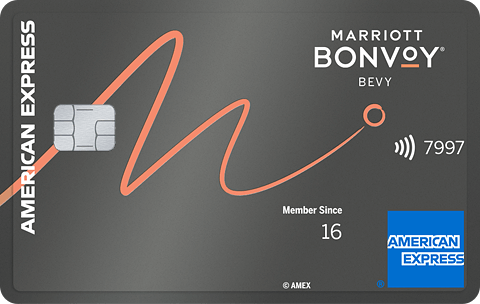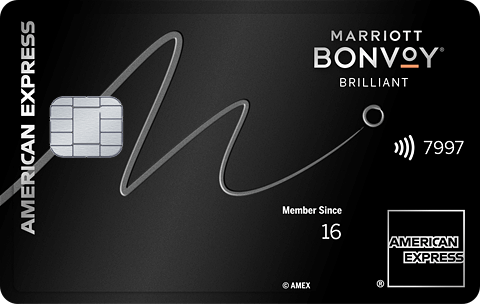8 Things to Know Before Getting a Marriott Credit Card
Understand your spending and travel habits so you can pick the card that will deliver the most value for you.

Many or all of the products on this page are from partners who compensate us when you click to or take an action on their website, but this does not influence our evaluations or ratings. Our opinions are our own.
A Marriott credit card can help you earn free hotel nights at more than 8,000 properties in exciting destinations around the globe, from budget-friendly city hotels to spectacular overwater bungalows in the Maldives. Here's what to know before applying for one.
★ LIMITED TIME OFFER
Two Marriott Bonvoy credit cards from Chase are offering limited-time bonus offers for new cardholders. Those who are approved for the $0-annual-fee Marriott Bonvoy Bold® Credit Card can earn a bonus worth more than twice as much as the previous offer. Those who get the Marriott Bonvoy Boundless® Credit Card, meanwhile, can earn five free nights, worth up to 50,000 points each, for hitting a spending threshold. Get the full details and apply here.
1. Marriott Bonvoy offers six credit cards
There are six Marriott Bonvoy credit cards currently available: five for consumers and one for businesses. All of the cards are issued through Chase or American Express and come with a chance to earn a welcome bonus:
Marriott Bonvoy Bold® Credit Card (annual fee: $0). Welcome offer: Earn 60,000 Bonus Points plus 1 Free Night Award after spending $2,000 on purchases in the first 3 months from account opening with the Marriott Bonvoy Bold® Credit Card! Free Night Award valued up to 50,000 points. Certain hotels have resort fees.
Marriott Bonvoy Boundless® Credit Card (annual fee: $95). Welcome offer: Our best offer is back! Earn 5 Free Nights (each night valued up to 50,000 points) after spending $5,000 on eligible purchases within 3 months of account opening with your Marriott Bonvoy Boundless® Credit Card. Certain hotels have resort fees.
Marriott Bonvoy Bevy® American Express® Card (annual fee: $250; see rates and fees). Welcome offer: Earn up to 135,000 Marriott Bonvoy® bonus points. Earn 85,000 points after you spend $5,000 and an extra 50,000 points after you spend an additional $2,000 in purchases on the Card within your first 6 months of Card Membership. Terms Apply.
Marriott Bonvoy Bountiful™ Card (annual fee: $250). Welcome offer: Earn 85,000 Bonus Points after you spend $4,000 in purchases in your first 3 months from your account opening.
Marriott Bonvoy Brilliant® American Express® Card (annual fee: $650; see rates and fees). Welcome offer: Earn up to 150,000 Marriott Bonvoy® bonus points. Earn 100,000 points after you spend $6,000 and an extra 50,000 points after you spend an additional $2,000 in purchases on the Card within your first 6 months of Card Membership. Terms Apply.
Marriott Bonvoy Business® American Express® Card (annual fee: $125; see rates and fees). Welcome offer: Earn 3 Free Night Awards after you use your new Card to make $6,000 in eligible purchases within the first 6 months of Card Membership. Each Free Night Award has a redemption level up to 50,000 Marriott Bonvoy® points, for a total potential value of up to 150,000 points, at hotels participating in Marriott Bonvoy®. Certain hotels have resort fees. Terms apply.
$0.
$95.
$250.
$650.
• 3 Marriott Bonvoy® points per $1 at participating Marriott Bonvoy hotels.
• 2 points per $1 on grocery stores, rideshare, select food delivery, select streaming and internet, cable and phone services.
• 1 point per $1 on all other eligible purchases.
• 6 Marriott Bonvoy® points per $1 at participating Marriott Bonvoy hotels.
• 3 points per $1 on up to $6,000 a year in combined purchases on grocery stores, gas stations and dining.
• 2 points per $1 on all other eligible purchases.
• 6 Marriott Bonvoy® points per $1 at participating Marriott Bonvoy hotels.
• 4 points per $1 on up to $15,000 a year in combined purchases at U.S. supermarkets and at restaurants worldwide (including takeout and delivery in the U.S).
• 2 points per $1 on all other eligible purchases.
Terms apply.
• 6 Marriott Bonvoy® points per $1 at participating Marriott Bonvoy hotels.
• 3 points per $1 at restaurants worldwide and on flights booked directly with airlines.
• 2 points per $1 on all other eligible purchases.
Terms apply.
• Silver Elite Status
• Free Night Award (valued up to 35,000 points) every year after account anniversary.
• 15 Elite Night Credits annually, qualifying you for Silver Elite status, plus path to Gold Status when you spend $35,000 on purchases each calendar year.
• 1 Elite Night Credit toward Elite Status for every $5,000 you spend.
• Free Night Award (valued up to 50,000 points) after spending $15,000 in a calendar year.
• Gold status, plus 15 Elite Night credits each year toward Platinum Elite status.
• 1,000 points per paid eligible stay booked directly with Marriott Bonvoy at participating properties. Terms apply.
• Free Night Award (valued up to 85,000 points) every year after your account renewal month.
• Platinum status and 25 Elite Night credits per year.
• Fee credit for either Global Entry or TSA Precheck.
• Priority Pass Select lounge membership (enrollment required).
• Up to $300 in statement credits per calendar year (up to $25 per month) for eligible purchases at restaurants worldwide.
• Terms apply.
Earn 60,000 Bonus Points plus 1 Free Night Award after spending $2,000 on purchases in the first 3 months from account opening with the Marriott Bonvoy Bold® Credit Card! Free Night Award valued up to 50,000 points. Certain hotels have resort fees.
Our best offer is back! Earn 5 Free Nights (each night valued up to 50,000 points) after spending $5,000 on eligible purchases within 3 months of account opening with your Marriott Bonvoy Boundless® Credit Card. Certain hotels have resort fees.
Earn up to 135,000 Marriott Bonvoy® bonus points. Earn 85,000 points after you spend $5,000 and an extra 50,000 points after you spend an additional $2,000 in purchases on the Card within your first 6 months of Card Membership. Terms Apply.
Earn up to 150,000 Marriott Bonvoy® bonus points. Earn 100,000 points after you spend $6,000 and an extra 50,000 points after you spend an additional $2,000 in purchases on the Card within your first 6 months of Card Membership. Terms Apply.
» Learn more: The best ways to rack up Marriott Bonvoy points
2. Bonvoy points are more valuable at some hotels than at others
Dreaming of Hawaii? Depending on when you go, you might find a room at the Royal Hawaiian, A Luxury Collection Resort on Oahu for 61,000 Marriott Bonvoy® points per night. Or you could head to the Big Island and stay at the stunning Mauna Kea Beach Hotel, Autograph Collection for 92,500 points. The Royal Hawaiian seems like a better deal, until you check the cash prices.
That Royal Hawaiian room is worth $478 in cash, which means you’re getting about 0.78 cent per point in value: ($478 / 61,000 points) x 100 = 0.78 cent. But that Mauna Kea room costs $1,009, meaning you get 1.09 cents of value for every point you redeem: ($1,009 / 61,000 points) x 100 = 1.09 cents.
Search for rooms at places you might want to stay in the future and compare the cash price to the points price. This will help you decide how valuable Marriott Bonvoy points will be to you. Use the NerdWallet average of 0.9 cent per Bonvoy point as your benchmark for whether you're getting a great, average or bad deal.
» Learn more: What makes Marriott unique?
3. Resort fees aren’t included in 'free' hotel nights
Resort fees, unfortunately, have cropped up everywhere. These charges let hotels advertise seemingly great room rates because the properties can pad their profits by tacking on fees sometimes exceeding $40 per night.
Hyatt and Hilton waive resort fees when you book your room using points. Marriott does not. So your “free” award stay at a Marriott family property could actually still cost you quite a bit out of pocket.
» Learn more: Which hotels have the worst resort fees?
4. Marriott points transfer to 39 airline loyalty programs
Sometimes you really need a few extra American Airlines AAdvantage miles for a ticket home for the holidays. Other times, you may find yourself just shy of enough Air France-KLM Flying Blue miles to get to Paris, or maybe you need just a few more Qantas Frequent Flyer miles to explore the Australian outback.
A stash of Marriott Bonvoy points could be your salvation. Marriott points can be converted into the points or miles of these airline loyalty programs and others, in most cases at a 3:1 ratio. That means every 3 Bonvoy points will get you 1 airline mile.
You can earn a 5,000-mile bonus for every multiple of 60,000 Bonvoy points you transfer to a frequent flyer program. Note that this transfer bonus does not apply to American, Delta or Avianca.
5. You can have more than one Marriott credit card
Two financial institutions offer Marriott Bonvoy credit cards: Chase Bank and American Express. This makes it easy to take out more than one card to earn even more bonus points and perks. But if you go this route, be strategic. Annual fees, and the opportunity costs of using multiple Marriott cards instead of, say, an airline card, can mean diminishing returns.
Also note that both Chase and AmEx restrict you from earning a welcome offer if you've earned one on any Marriott Bonvoy card within the last 24 months.
6. Marriott credit card perks go beyond mere points
Extra perks can make or break the value you extract from the card — especially if you’re paying upfront for an annual fee. Consider which benefits you’ll use before choosing a Marriott credit card. Examples include:
Rental car coverage
The Marriott Bonvoy Brilliant® American Express® Card and Marriott Bonvoy Bevy® American Express® Card come with rental car insurance if you use it to pay for your rental; however, the Marriott Bonvoy Boundless® Credit Card and Marriott Bonvoy Bountiful™ Card don't. Terms apply.
Elite status
The Marriott Bonvoy Brilliant® American Express® Card comes with Platinum status and the Marriott Bonvoy Bountiful™ Card, Marriott Bonvoy Bevy® American Express® Card and the Marriott Bonvoy Business® American Express® Card get you Gold status in the Marriott elite status program.
The Marriott Bonvoy Bold® Credit Card and the Marriott Bonvoy Boundless® Credit Card provide you with Silver status. Terms apply.
Free night award certificates
The Marriott Bonvoy Boundless® Credit Card comes with a free night award every year worth up to 35,000 points. The Marriott Bonvoy Brilliant® American Express® Card gets you a free night every year after your card renewal month worth up to 85,000 points. Terms apply.
The Marriott Bonvoy Bountiful™ Card and the Marriott Bonvoy Bevy® American Express® Card come with a free night award worth 50,000, but only after you spend $15,000 in a calendar year. Terms apply.
7. Your shopping habits can decide the best card for you
All of the Marriott credit cards are designed to reward you for spending money at Marriott-family hotels, but they will also give you bonus points for other types of purchases. For example, the Marriott Bonvoy Brilliant® American Express® Card pays 3X points for every dollar you spend at restaurants worldwide and on flights purchased directly from an airline, while the Marriott Bonvoy Bevy® American Express® Card and Marriott Bonvoy Bountiful™ Card both earn 4X points at eligible restaurants and supermarkets.
On the other hand, the Marriott Bonvoy Business® American Express® Card pays 4 points per dollar charged at U.S. restaurants, U.S. gas stations, on wireless telephone services purchased directly from U.S. service providers, and on U.S. purchases for shipping. Terms apply.
Think about the kinds of charges you’ll be making to help decide which card is best for you.
8. But a higher annual fee doesn't always mean more value
Marriott Bonvoy offers five consumer credit cards with annual fees ranging from $0 to $650. Frequent travelers who usually stay at Marriott hotels can offset the premium Marriott Bonvoy Brilliant® American Express® Card's high annual fee ($650) by taking advantage of the card's free night award, $300 statement credit for spending for eligible purchases at restaurants and TSA PreCheck or Global Entry fee credit (terms apply, enrollment required).
But people who won't get enough value out of the card to justify the annual fee (or just don't want to spend that kind of money) will likely be better off choosing the $95-annual-fee Marriott Bonvoy Boundless® Credit Card rather than the Marriott Bonvoy Bevy® American Express® Card ($250) or Marriott Bonvoy Bountiful™ Card ($250). The $250 annual fees on those two cards will get you higher rewards at supermarkets and restaurants, plus higher status with Marriott. But the free night isn't automatic. You'll only qualify once you spend $15,000 in a calendar year. Terms apply. Meanwhile, the Marriott Bonvoy Boundless® Credit Card's 35,000-point free night award is automatic on your account anniversary and will more than cover the card's annual fee.
» Learn more: Do Marriott points expire?
The information related to Marriott Bonvoy Bountiful™ Card has been collected by NerdWallet and has not been reviewed or provided by the issuer of this card.
To view rates and fees of the Marriott Bonvoy Bevy® American Express® Card, see this page. To view rates and fees of the Marriott Bonvoy Brilliant® American Express® Card, see this page. To view rates and fees of the Marriott Bonvoy Business® American Express® Card, see this page.
Insurance Benefit: Car Rental Loss & Damage Insurance
Car Rental Loss and Damage Insurance can provide coverage up to $75,000 for theft of or damage to most rental vehicles when you use your eligible Card to reserve and pay for the entire eligible vehicle rental and decline the collision damage waiver or similar option offered by the Commercial Car Rental Company. This product provides secondary coverage and does not include liability coverage. Not all vehicle types or rentals are covered. Geographic restrictions apply.
Eligibility and Benefit level varies by Card. Terms, Conditions and Limitations Apply.
Please visit americanexpress.com/benefitsguide for more details.
Underwritten by AMEX Assurance Company. Car Rental Loss or Damage Coverage is offered through American Express Travel Related Services Company, Inc.
Insurance Benefit: Car Rental Loss & Damage Insurance
Car Rental Loss and Damage Insurance can provide coverage up to $50,000 for theft of or damage to most rental vehicles when you use your eligible Card to reserve and pay for the entire eligible vehicle rental and decline the collision damage waiver or similar option offered by the Commercial Car Rental Company. This product provides secondary coverage and does not include liability coverage. Not all vehicle types or rentals are covered. Geographic restrictions apply.
Eligibility and Benefit level varies by Card. Terms, Conditions and Limitations Apply.
Please visit americanexpress.com/benefitsguide for more details.
Underwritten by AMEX Assurance Company. Car Rental Loss or Damage Coverage is offered through American Express Travel Related Services Company, Inc.
How to maximize your rewards
You want a travel credit card that prioritizes what’s important to you. Here are some of the best travel credit cards of 2025:
Flexibility, point transfers and a large bonus: Chase Sapphire Preferred® Card
No annual fee: Wells Fargo Autograph® Card
Flat-rate travel rewards: Capital One Venture Rewards Credit Card
Bonus travel rewards and high-end perks: Chase Sapphire Reserve®
Luxury perks: The Platinum Card® from American Express
Business travelers: Ink Business Preferred® Credit Card














